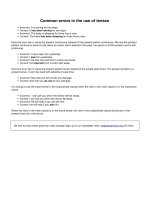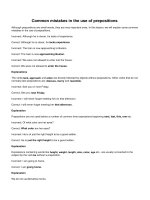Common mistakes in the use of prepositions
Bạn đang xem bản rút gọn của tài liệu. Xem và tải ngay bản đầy đủ của tài liệu tại đây (9.12 KB, 2 trang )
Common mistakes in the use of prepositions
Although prepositions are small words, they are very important ones. In this lesson, we will explain some common
mistakes in the use of prepositions.
Incorrect: Although he is clever, he lacks of experience.
Correct: Although he is clever, he lacks experience.
Incorrect: The train is now approaching to Boston.
Correct: The train is now approaching Boston.
Incorrect: We were not allowed to enter into the house.
Correct: We were not allowed to enter the house.
Explanations
The verbs lack, approach and enter are directly followed by objects without prepositions. Other verbs that do not
normally take prepositions are: discuss, marry and resemble.
Incorrect: See you on next Friday.
Correct: See you next Friday.
Incorrect: I will never forget meeting her on that afternoon.
Correct: I will never forget meeting her that afternoon.
Explanation
Prepositions are not used before a number of common time expressions beginning next, last, this, one etc.
Incorrect: Of what color are her eyes?
Correct: What color are her eyes?
Incorrect: He is of just the right height to be a good soldier.
Correct: He is just the right height to be a good soldier.
Explanation
Expressions containing words like height, weight, length, size, color, age etc., are usually connected to the
subject by the verb be without a preposition.
Incorrect: I am going to home.
Correct: I am going home.
Explanation
We do not use to before home.
Incorrect: To where shall I send it?
Correct: Where shall I send it to?
Explanation
The structures where …to?, what…like? and what…for? have a fixed word order. It is not possible to move the
preposition to the beginning of the clause.
Stay on top of your writing! Download our grammar guide from www.englishgrammar.org to stay up-to-date.
Powered by TCPDF (www.tcpdf.org)









